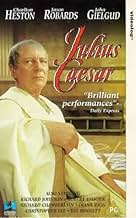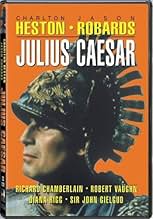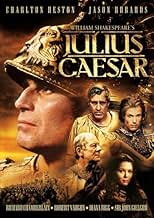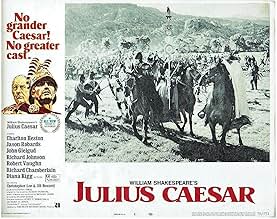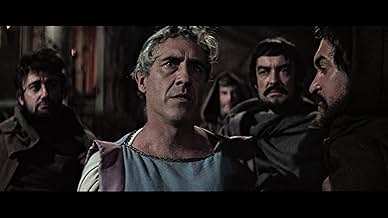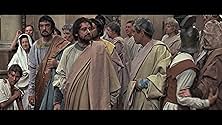Eine Starbesetzung spielt in diesem Remake aus dem Jahre 1970 des Klassikers von William Shakespeare über den Verrat des römischen Senats an ihrem Imperator, den Intrigen, die zum Attentat a... Alles lesenEine Starbesetzung spielt in diesem Remake aus dem Jahre 1970 des Klassikers von William Shakespeare über den Verrat des römischen Senats an ihrem Imperator, den Intrigen, die zum Attentat an der Titelfigur führen.Eine Starbesetzung spielt in diesem Remake aus dem Jahre 1970 des Klassikers von William Shakespeare über den Verrat des römischen Senats an ihrem Imperator, den Intrigen, die zum Attentat an der Titelfigur führen.
- Regie
- Drehbuch
- Hauptbesetzung
- Julius Caesar
- (as Sir John Gielgud)
Empfohlene Bewertungen
Featuring a mixed cast of British and American actors, the result is mainly predictable but some surprises and disappointments also feature. One disappointment is Gielgud as Caesar. Sir John was a veteran Shakespearian by 1970 with a fine voice and tons of dignity. Yet at sixty-six he was a touch too old for the part. More to the point, the effete Gielgud lacked the masculine force to play this virile ex-general whose battlefield victories were said to be matched only by his conquests in the bedroom.
One surprise is the subtle portrayal of the conspirator Casca by American Robert Vaughan. "Sour" Casca, the cynical observer, is a minor character but sharply drawn and Vaughan makes him come alive during his few minutes on stage. Jill Bennet is sympathetic as the prophetic wife of Caesar but in the role of Brutus' wife the well-born Portia, Diana Rigg at age thirty-two looks luscious and is simply superb--Shakespeare in the finest style. Another veteran Shakespearian, Richard Johnson, is nearly as good as the jealous, manipulative Cassius.
Jason Robards plays Brutus like a wooden Indian for the first two acts. In the third act however--that is, after Brutus and Cassius have fled Rome--he seems to grow in the part and his acting gains conviction.
The importance of the plebeians to the play was understood by this director, who cast the roles carefully.
The most jarring for the military afficionados is the inappropriate armor and armament for the soldiers. The generals wear naval hats, and the armor is some kind of mish mash from other periods in history. I can only guess that this was done because the director liked the style (which was common for this period in film making for Hollywood to take such atrocious liberties with history).
It's worth it for seeing Chuck Heston's Marc Antony, but the version with Marlon Brando some yhears earlier (shot in black and white) is the one to see.
For all it's flaws, and there are many, this 1970 version staring Heston is worth a look. Heston plays Marc Antony as a passionate loyalist who seethes with the angst of betrayal, and does an ecellent job of it. Gielgud's Julius Caesar is solid, but I think the audience deserved someone with more gravitas and "a martial countenance", to borrow from the language of the time.
See it once.
Antony and Brutus are each worried about their place in Caesar's affections and Brutus figures he's lost out to Antony. It makes him an easy mark for Cassius's plots. After the dirty deed of assassination is done, it's Antony and Octavius though they are teaming up against the conspirators, you can tell both in this version and in the better Fifties version that MGM put out that they will soon be at odds.
Charlton Heston is a strong Antony here, but unfortunately for the play to succeed you need an equally strong Brutus. That's not what you get in Jason Robards, Jr. For a man who in his time was considered the greatest interpreter of Eugene O'Neill, when it comes to Shakespeare the man was out of his league. No reflection on him, everyone has casting limitations.
A real good interpreter of the Bard who played Cassius back in 1954 plays Caesar here. John Gielgud is equally fine in both versions. And Richard Johnson and Robert Vaughn are superb as conspirators Cassius and Casca. And Richard Chamberlain who was trying very hard to shed his Dr. Kildare image is fine as the cunning Octavian who Antony ultimately underestimates.
Charlton Heston in his memoirs takes blame for casting Robards and Robards himself realized he was miscast. Oddly enough in that earlier version James Mason as Brutus was the best one in the film.
And then there's the political/historical tragedy that is JULIUS CAESAR.
The 1953 version, adapted for the screen and directed by Joseph Mankiewicz, was and still is considered one of the best of the Bard's adaptations ever to make it to the screen. And then in 1969, an enterprising and young Canadian producer named Peter Snell decided to mount a new adaptation of this work. The result was, by all accounts, one that arguably fell into the shadow of Mankiewicz's version, which after all had Marlon Brando as Marc Antony; Louis Calhern as Caesar; and Sir John Gielgud as Cassisus, one of the conspirators. Indeed, many consider this film wildly erratic for various reasons, including one quixotic bit of casting that didn't come off. Still, the play is the thing, as the old saying goes.
For this go-around at JULIUS CAESAR, the film is helmed by English director Stuart Burge, who did a yeoman adaptation of the Bard's OTHELLO in 1965, with Robert Furnival faithfully adapting the play to good effect. And you have, in the main, a great cast. Gielgud appears here in the title role, and he does a superlative job. Charlton Heston does a solid turn as Marc Antony (although in his journals he admits that's not such a big trick, since, in his view, if you can't do Marc Antony, you probably shouldn't be doing The Bard in the first place). The film also benefits from the turns given by Richard Chamberlain (as Octavius Caesar), Robert Vaughn (as Casca), Christopher Lee (as Artemidorus), Richard Johnson (as Cassius), Diana Rigg (as Portia), and Jill Bennett (as Calpurnia).
The thing, though, is that a lot of the focus of the play, and subsequently the film, is not so much on Caesar as much as it is on Marcus Brutus, the man torn between his allegiance to Caesar and a need to save the Roman Republic from Caesar's machinations. It takes a solid performance to pull it off really well; and if the actor doing Brutus isn't well versed in Shakespeare, the film will invariably suffer. This is what happens here, with Jason Robards having accepted a role he just wasn't cut out for, when the oft-elusive Orson Welles was unavailable.. What worked in the plays of Eugene O'Neill, and on screen in films like ALL THE PRESIDENT'S MEN, ONCE UPON A TIME IN THE WEST, THE BALLAD OF CABLE HOGUE, and MAGNOLIA doesn't really work well here. He is simply a great actor in a great role, but it was not one that he could have ever showed his best at—though over the course of the film, he does improve.
That having been said, the stellar performances of Heston, Gielgud, Vaughn, and the others make up for Robards' inadequacies; and Burge's direction, while not really on a par with Welles, Olivier, or Zefirelli, is solid enough. Clearly, this isn't the most successful adaptation of The Bard. But given how hard it is to pull Shakespeare off cinematically, it is worth a 7 (out of 10).
Wusstest du schon
- WissenswertesRobert Vaughn says in his memoirs that Jason Robards, Jr. was very unhappy during the filming period, and dubious about the end result.
- PatzerCassius drinks from a wooden cup during the riot scene. When he throws the wooden cup it makes a sound as if it was glass.
- Zitate
Julius Caesar: Let me have men about me that are fat; Sleek-headed men, and such as sleep o' nights. Yond Cassius has a lean and hungry look; He thinks too much: such men are dangerous.
- VerbindungenFeatured in History Buffs: Rome Season Two (2017)
Top-Auswahl
- How long is Julius Caesar?Powered by Alexa
Details
- Erscheinungsdatum
- Herkunftsländer
- Offizieller Standort
- Sprache
- Auch bekannt als
- Julio César
- Drehorte
- Produktionsfirma
- Weitere beteiligte Unternehmen bei IMDbPro anzeigen
- Laufzeit
- 1 Std. 57 Min.(117 min)
- Sound-Mix
- Seitenverhältnis
- 2.35 : 1

